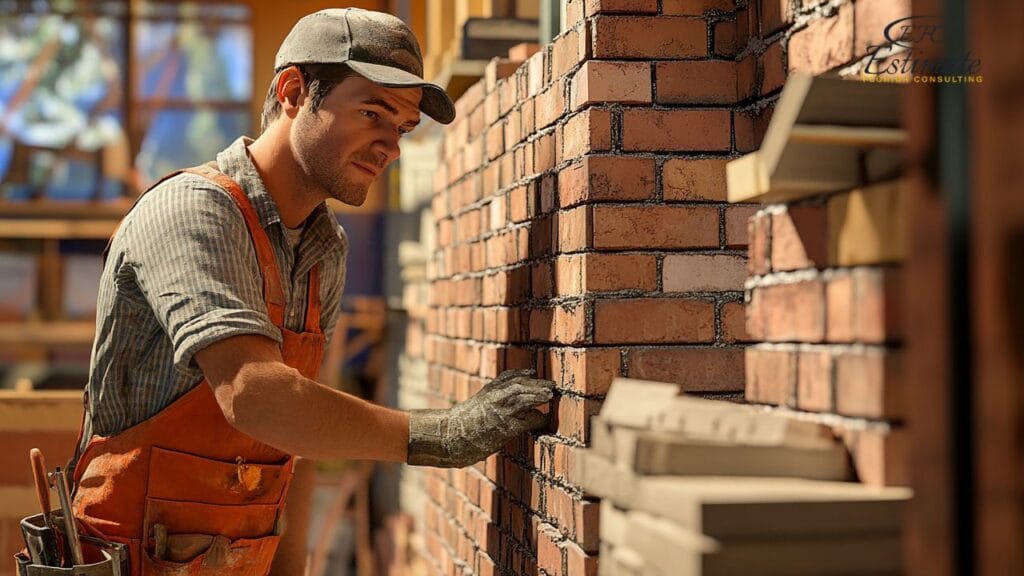- Homepage
- Blogs
Choosing the Right Masonry Materials
When it comes to building projects, the materials you choose can make or break the final result. Whether you’re constructing a home, a garden wall, or a decorative feature, selecting the right masonry materials is critical. The wrong choice can lead to costly repairs, while the right one ensures durability, aesthetic appeal, and structural integrity. In this guide, we’ll walk you through the key factors to consider and the different types of masonry materials available to help you make the best choice for your project.
What is Masonry?

Masonry refers to the construction of structures from individual units, which are often bound together by mortar. These units can be brick, stone, concrete blocks, or manufactured stone veneers, all of which have different properties that make them suited to various types of projects. Masonry has been used for thousands of years in construction, ranging from ancient stone walls to modern brick homes.
Masonry is known for its:
- Durability: Structures built with masonry materials can last for decades or even centuries.
- Aesthetic versatility: Different materials provide diverse visual appeal, from rustic stone to modern brick.
- Strength: Depending on the material, masonry can bear heavy loads and provide excellent structural support.
Factors to Consider When Choosing Masonry Materials
Before diving into the specifics of each material, it’s important to evaluate several key factors that will influence your decision.
Masonry materials must withstand the test of time, particularly in regions where weather conditions are extreme. The durability of a material depends on how well it resists wear, cracking, and erosion.
Masonry materials come in a variety of textures, colors, and patterns. The visual appeal of your project depends largely on the material you choose. There are significant cost differences between materials. Some, like natural stone, are more expensive to source and install, while others, like concrete blocks, are more affordable.
Structural Needs
Certain projects require stronger materials for structural integrity. For example, retaining walls or load-bearing structures require sturdy, durable materials such as concrete blocks or stone. Materials respond differently to environmental conditions, so it’s essential to choose masonry that will perform well in your specific climate.
The Cost-Effective Benefits
Laying tiles in the yard over a long distance can significantly save both time and money compared to maintaining a traditional lawn. While the upfront cost of installing tiles may seem higher, the long-term benefits far outweigh the initial investment. Lawn care, including mowing, watering, fertilizing, and pest control, can be costly and time-consuming, especially over large areas. Even expenses related to maintaining equipment, such as replacing Toro aftermarket parts for lawnmowers, add to the overall cost. In contrast, tiled surfaces require minimal upkeep, eliminating the need for regular maintenance and reducing water consumption. Over time, the savings on lawn care, combined with the durability and low-maintenance nature of tiles, make them a more cost-effective solution for homeowners looking to reduce yard upkeep.
Types of Masonry Materials
Now that we’ve covered the key considerations, let’s take a closer look at the different types of masonry materials available:
Brick
Brick is a traditional, timeless masonry material that offers durability, thermal efficiency, and a classic aesthetic. Made from natural clay and shale, bricks are often kiln-fired, giving them their strength and ability to withstand the elements. Their natural insulation properties help regulate indoor temperatures, reducing energy costs in both hot and cold climates. Bricks also come in a variety of sizes, colors, and textures, making them suitable for various architectural styles.
Concrete Blocks
Concrete blocks, also known as concrete masonry units (CMUs), are made from cement, water, and aggregates. They are one of the most commonly used masonry materials, especially in structural applications. Due to their strength and affordability, they are ideal for constructing foundations and large-scale projects. They are available in various sizes and shapes, allowing for flexibility in design. Concrete blocks are also fire-resistant and provide good soundproofing for interior spaces.
Natural Stone
Natural stone offers a luxurious, high-end appearance and unmatched durability. Quarried from the earth, materials like granite, limestone, sandstone, and marble provide a unique and timeless aesthetic that works well in both modern and traditional designs. Due to its natural formation, no two pieces of stone are alike, which adds character to each project. While expensive and labor-intensive to install, natural stone is extremely durable and requires little maintenance once in place.
Manufactured Stone Veneer
Manufactured stone veneer is a lightweight alternative to natural stone. Made from concrete and designed to replicate the appearance of natural stone, these veneers offer a cost-effective option for achieving a similar aesthetic. Manufactured stone is easier to work with, particularly in applications where weight and installation complexity are concerns. Despite being lighter and more affordable, some high-quality veneers are visually indistinguishable from natural stone.
Each masonry material has its unique characteristics, advantages, and disadvantages. Choosing the right one depends on your project’s specific needs, whether you’re looking for durability, aesthetic appeal, or affordability. By understanding these materials in depth, you can make an informed decision that ensures your project stands the test of time.
Conclusion
Choosing the right masonry material is a crucial step in any construction project. By considering factors like durability, aesthetics, cost, and climate, you can ensure that your project looks great and stands the test of time. Whether you opt for classic brick, sturdy concrete blocks, or elegant natural stone, consult with professionals and thoroughly research your options.

